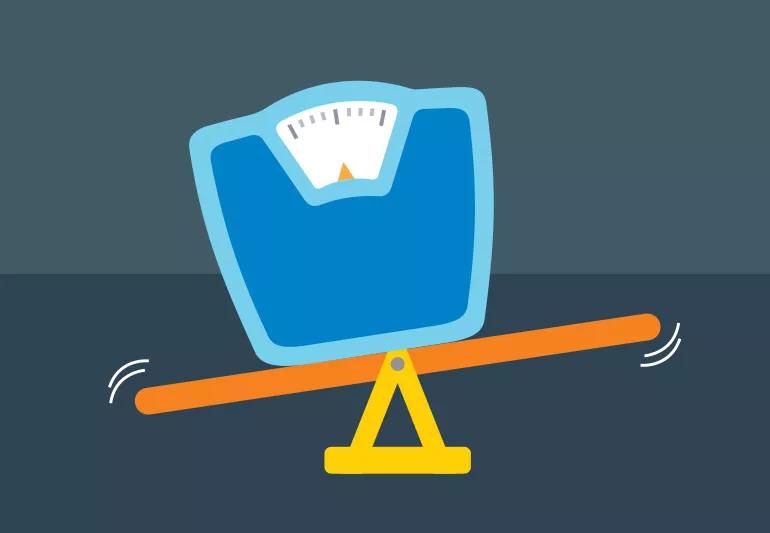Plus 4 ways to break the cycle + maintain your weight loss

You — and your diet — have been firing on all cylinders. The weight is melting off, and you’re feeling your best. But then there is that seemingly inevitable backslide, with pound after pound creeping back on despite your best efforts. It’s the ultimate Catch-22.
Advertisement
Cleveland Clinic is a non-profit academic medical center. Advertising on our site helps support our mission. We do not endorse non-Cleveland Clinic products or services. Policy
But before you beat yourself up, endocrinologist and obesity specialist Marcio Griebeler, MD, has some welcome news: It’s most likely not your fault.
“Your body is fighting to keep your weight as it was before the dieting,” he says. But take heart — it’s possible to win the battle.
Experts think as many as 80 to 95% of dieters gain back the weight they’ve worked so hard to lose. Why? (WHY?!?)
Dr. Griebeler says the culprit is your “weight set point”: the weight your body is programmed to be. Your weight set point is a combination of several factors, including your:
Weight set point and metabolism play for the same team: Your metabolism burns energy at a rate that will maintain your weight set point, even if that point is heavier than is healthy.
“Most of the time, weight gain is gradual, and that can raise your set point gradually, too,” notes Dr. Griebeler. “But certain lifestyle changes can lower it.”
Beware of the quick-fix, Dr. Griebeler warns. “A fad diet won’t change your set point. It’s just restricting calories,” he says. “Your body is very efficient. You can successfully lose weight for a while, but at some point, your body simply adjusts to need fewer calories to function.”
Which means weight loss will eventually stop, unless you start eating even less than your diet calls for. (You can see where this is going.)
Advertisement
Your body is also a survivor. As soon as calories drop, it starts doing everything in its power to prevent starvation, including:
These effects stick around for the long-term. Remember the television show The Biggest Loser? Contestants still felt the effects of their calorie deprivation six years later, making it harder to keep the weight off.
“Research tells us that yo-yo dieting can negatively affect your metabolism,” Dr. Griebeler says. “It doesn’t matter the diet: low-carb, low-fat, ketogenic, whatever. We see rebound weight gain almost every time.”
To maintain weight loss for good, Dr. Griebeler advises focusing on these four areas:
Diet. How can you create a healthy, long-term, stick-with-it diet?
Exercise. Be an equal opportunity exerciser: Do both aerobic exercise (three to five times a week) and resistance training (two to three times nonconsecutively each week). Shoot for at least 25 to 35 minutes on most days.
Exercise works best for staving off weight gain (not jumpstarting weight loss), so recognize that binging on exercise can be just as bad as binging on food. “Exercise can make people super hungry, while it makes others tired and inactive, which can negate the activity they did,” Dr. Griebeler explains.
But it’s also important to remember the cardiovascular benefits of exercise, independent of weight loss. “Exercise is always good and important,” he says.
Stress. Stress not only causes some people to eat more, but it also raises levels of the stress hormone cortisol. “If you have more cortisol, you end up with higher insulin and lower blood sugar levels,” Dr. Griebeler says. (Cue the cravings.) To cope, put down the fork and try meditating or talking to a trusted friend.
Sleep. Not getting enough sleep raises cortisol levels, too. It also affects decision-making (read: your ability to stick to healthy habits). Seven to nine hours every night is the magic number you need to help you manage stress. It also helps your body work with you — and not against you — when it comes to weight loss.
Advertisement
Advertisement
Learn more about our editorial process.
Advertisement

Alternating between periods of eating and fasting may benefit your health

This plant-based eating plan focuses on lowering cholesterol, making it a great companion to the Mediterranean diet

Choose foods that are low in fiber and easy to chew and swallow

The flexible eating plan aims to boost your brain health by focusing on plant-based foods and limiting saturated fat

Designed to lower your blood pressure, this eating plan focuses on heart-healthy foods like whole grains, fruits and vegetables

Pescatarians don’t eat poultry, game or red meat, but they do eat fish and seafood, dairy and eggs

This eating style has many health benefits, including weight loss, an improved microbiome, and increased nutrient and mineral consumption

Research shows promising results from options like the DASH diet and Mediterranean diet

Wearing a scarf, adjusting your outdoor activities and following your asthma treatment plan can help limit breathing problems

Your diet in the weeks, days and hours ahead of your race can power you to the finish line

When someone guilt trips you, they’re using emotionally manipulative behavior to try to get you to act a certain way